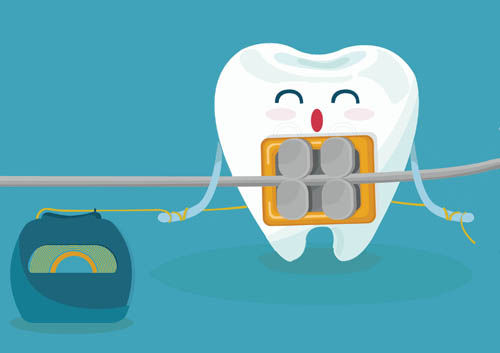September 26th, 2018

The Max Mosslehi, DMD, Inc. team knows that oral hygiene is important, whether you have braces on your teeth or not. But if you are a person who wears braces, caring for your teeth and gums can become somewhat challenging. Without daily oral hygiene practices, you may become prone to cavities and tooth decay during your time in braces.
Naturally, you know that brushing your teeth each morning and night, as well as after you eat, will help keep your mouth healthy and clean during the months you wear braces. But flossing is also an important part of your hygiene routine. Flossing with braces can be tricky, but it’s not impossible. Dr. Max Mosslehi, your general dentist, or your dental hygienist can help you become more comfortable and adept at flossing your teeth during the months you wear braces.
Flossing Tips for Those with Braces
- Use Tools Provided by Our Office. A floss threader is a small, plastic needle that will help you floss between the wires and your teeth. Thread a 12-to-18-inch piece of floss onto the needle, and use the needle to get the floss easily behind the wires.
- Flossing Under the Wires. Once the floss is behind the wires, use your hands to manipulate the floss. Move it up and down along the wires to remove food particles.
- Flossing Between Your Teeth. Floss between your teeth as you normally would without braces. Move the floss up and down between your teeth, using a clean section of floss for each tooth.
- After You Finish Flossing. Your orthodontist may have suggested that you use a water pik or proxy brush after you finish brushing. Either of these tools will help remove any loosened food particles to ensure that your teeth and braces are clean.
Continue Good Oral Hygiene Habits
Good oral hygiene habits you use while wearing braces will help you achieve the beautiful smile you and the Max Mosslehi, DMD, Inc. team have been working toward. Once your braces are off, it may be tempting to slack off on the brushing and flossing. Don’t let yourself fall into any habits that will have a negative impact on your oral health or the attractive smile you waited for throughout the months you wore braces. See your general dentist for regular cleanings, and continue to brush and floss your teeth each day.
September 19th, 2018

You may have noticed that kids seem to be getting braces and other orthodontic care a lot earlier these days. There was a time, only a decade or two ago, when braces were mainly seen on teenagers, but that is beginning to change. If you’re wondering when to bring your child to our Tustin office for an orthodontic evaluation, the answer actually has several parts.
The Telltale Signs
If your child has a very crowded set of adult teeth coming in, or if the permanent front teeth came in very early, these are signs that your child should see Dr. Max Mosslehi, regardless of age.
The Dental Age
Barring signs of trouble or early adult teeth as mentioned above, the time that your child needs to be seen for initial orthodontic evaluation depends not so much upon your child’s actual age, but on what is known as a “dental age.”
The dental age of the patient might be entirely different from his or her actual chronological age; for example, an eight-year-old could have a dental age of 13. It is part of Dr. Max Mosslehi and our staff’s job to determine the dental age and then make appropriate recommendations for the resolution of orthodontic issues if they are emerging.
The Official Recommended Age
The American Association of Orthodontists officially recommends that kids should see an orthodontist for the first time between the ages of seven and nine. Even if the child does not have all his or her permanent teeth, the teeth growth pattern can usually be predicted quite effectively by an orthodontist.
This allows for a proactive response to emerging problems, and this is the reason that some younger children are now getting orthodontic devices earlier in life. If a young child has serious orthodontic issues emerging, Dr. Max Mosslehi can usually address the problems immediately and then follow up with another round of treatment when the child has all the adult teeth.
September 12th, 2018

When we talk about teeth, every single one of yours counts. Whether you’ve lost a tooth due to injury or poor oral hygiene, it’s worth seeing Dr. Max Mosslehi to evaluate all your replacement options. If you don’t, you could suffer negative effects to your teeth, gums, jawbones, appearance, and self-esteem.
Depending on how many teeth are missing and where they are located, Dr. Max Mosslehi may suggest an implant, fixed bridge, or a removable bridge.
Addressing missing teeth as soon as possible is in your best interests. If you don't, the consequences might include:
- Shifting teeth: When you lose a tooth, the space it creates allows the neighboring teeth to drift and move out of alignment. A once-straight smile and correct bite can quickly turn into crooked teeth and a misaligned bite.
- Tooth decay and/or gum disease: After teeth have shifted, it can be harder to reach all areas around them to brush and floss properly. The buildup of bacteria and plaque can result in periodontal disease and the loss of your remaining teeth due to decay.
- Effect on jaws: Missing teeth alter your bite and how your teeth and jaws contact one another. This puts added strain on your jaw joint (TMJ) and can contribute to the development of TMJ disorder.
- Change in face and appearance: When you lose a tooth, your gums and your jawbone are no longer stimulated in that area. A dental implant replaces the root of a tooth or several teeth, and provides stimulation to prevent bone loss. If the root isn’t replaced, this can lead to deterioration of the jawbone and alteration of the shape and appearance of your face. Your face, especially the cheeks, can look older and more sunken.
Replacing missing teeth is an essential step for your physical and emotional health. If they are replaced in a timely manner at our Tustin office, you’ll continue to have the same wonderful smile you’ve always had.
September 5th, 2018

It's the end of summer, and fall is just around the corner. Soon the temperatures will cool down, the leaves will start to change, and Dr. Max Mosslehi and our team at Max Mosslehi, DMD, Inc. are sure that you’ll soon be thinking about Halloween costumes and Thanksgiving plans in no time. But wait! First, we want to know about your favorite parts of the summer! Did you go on a wonderful family trip? Did you pick up a new hobby? Did you try to spend as much time outside and in the sun as possible?
Share your favorite memories, stories, or photos with us by leaving a comment below or on our Facebook page.












 Website Powered by Sesame 24-7™
Website Powered by Sesame 24-7™